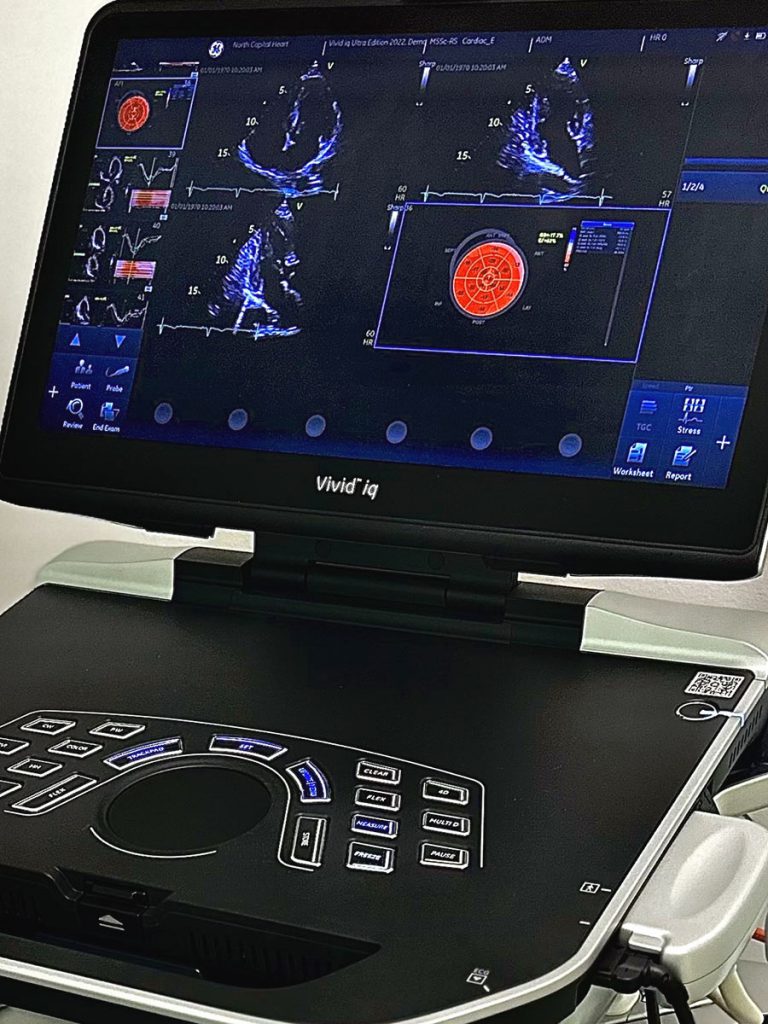1. Cardiac Consultation:
- NOTE that early consultations within 24-48 hours are available for urgent patients.
2. Diagnostic Tests:
- ECG
- 24-48 Hours Holter Monitoring
- Transthoracic Echocardiography (Echo)
- Exercise Stress Echocardiogram & Dobutamine stress echo
- Bubble study for intra-cardiac shunt
- Contrast echocardiogram
- Ambulatory Blood Pressure Monitoring (ABPM)
3. Advanced diagnostic cardiac Tests and procedures:
- Trans-oesophageal echocardiogram with 3D
- Coronary calcium Scan
- CT coronary angiography
- DC-Cardioversion for AF and atrial flutter

Cardiac procedures are performed at affiliated public or private hospital. The private hospitals our practice is attached to include Calvary Bruce Private Hospital and National Capital Hospital.
Electrocardiogram:
An Electrocardiogram (ECG) is a type of non-invasive, painless cardiac test that helps reveal the electrical activities of your heart. The purpose of an ECG is to detect any common heart problems, such as checking for palpitations, or possible causes of chest pain or shortness of breath.
ECGs are simple and safe procedures involving a cardiologist or nurse placing approximately 10 leads, attached to a machine, in various areas of your chest and abdomen. The test usually takes about 10-15 minutes, and afterwards, you can request a personal copy of your ECG.
Holter Monitoring:
Holter monitoring involves placing a type of heart monitor on your chest to help record your heart’s rhythms and rates over the course of 24-48 hours, while you go about your daily activities.
Echocardiogram:
An echocardiogram is a type of cardiac test that produces images of the heart using an ultrasound machine. The pictures taken allow us to see the various structures that make up the heart (valves, ventricles, atriums, and arteries), how your heart functions, whether there are any potential blood clots and more.
The procedure typically takes 20-30 minutes and involves a sonographer applying a gel and placing a hand-held device/probe on your chest to take the pictures.
Trans-oesophageal echocardiogram (TOE):
TOE is a type of echocardiogram used to produce high-quality images of the heart’s valves and chambers. This procedure takes about 30 minutes and involves inserting a special ultrasound probe into the mouth and oesophagus, positioning it behind the heart. TOE is performed under light sedation, and patients must fast for at least 6 hours before the procedure. Patients who have had TOE are not permitted to drive for 24 hours after the procedure.
Cardioversion (DC cardioversion):
DC cardioversion is a cardiac procedure that uses an electrical shock to the chest wall to revert your abnormal heart rhythm (Atrial fibrillation or flutter) to normal. The procedure takes about an hour and is performed under deep sedation administered by an anaesthetist. As sedation is required, you are not permitted to drive for 24 hours following the procedure.
Bubble study:
A bubble study is a type of test used to identify any intra-cardiac shunts (holes), and it is frequently performed on young patients who have had an unexpected stroke. The procedure involves inserting a cannula and injecting agitated saline into your arm. While the agitated saline is injected into your vein, the sonographer will use an echo machine to take cardiac images of your heart. If your bubble study results are positive, you may require a trans-oesophageal echocardiogram (TOE) to evaluate your heart further.
Cardiac CT (CT coronary angiography-CTCA):
Cardiac CT (also known as CT Coronary Angiogram) is a non-invasive imaging test that captures high-quality images of the coronary arteries (the vessels surrounding the heart). This test aims to detect and diagnose possible coronary artery disease (by looking for constricted or blocked arteries), but it can also help identify other heart conditions.
Your doctor or cardiologist can request cardiac CT if you have a strong family history of cardiac disease or are experiencing chest pain or shortness of breath.
This procedure takes about 2 hours to complete and involves minimal radiation and contrast and inserting a cannula into a patient’s vein. To ensure high-quality imaging, the patient will be given beta blockers 48 hours before and in the morning of the test to slow down their heart rate. GTN sublingual will also be prescribed while the patient is in the radiology department waiting to receive the images to dilate their blood vessels. Patients are required to avoid tea, coffee, chocolate, and any stimulant 24 hours before their test. As we use GTN for cardiac CT, patients must also avoid taking Viagra 24 hours before their test
CT coronary calcium score (Calcium score):
CT coronary calcium score is a type of CT that measures the amount of calcium (calcifications) and plaque in your coronary arteries. The procedure involves radiation but no contrast.
In North Canberra Hospital, Cardiac CT is combined with Calcium score.
